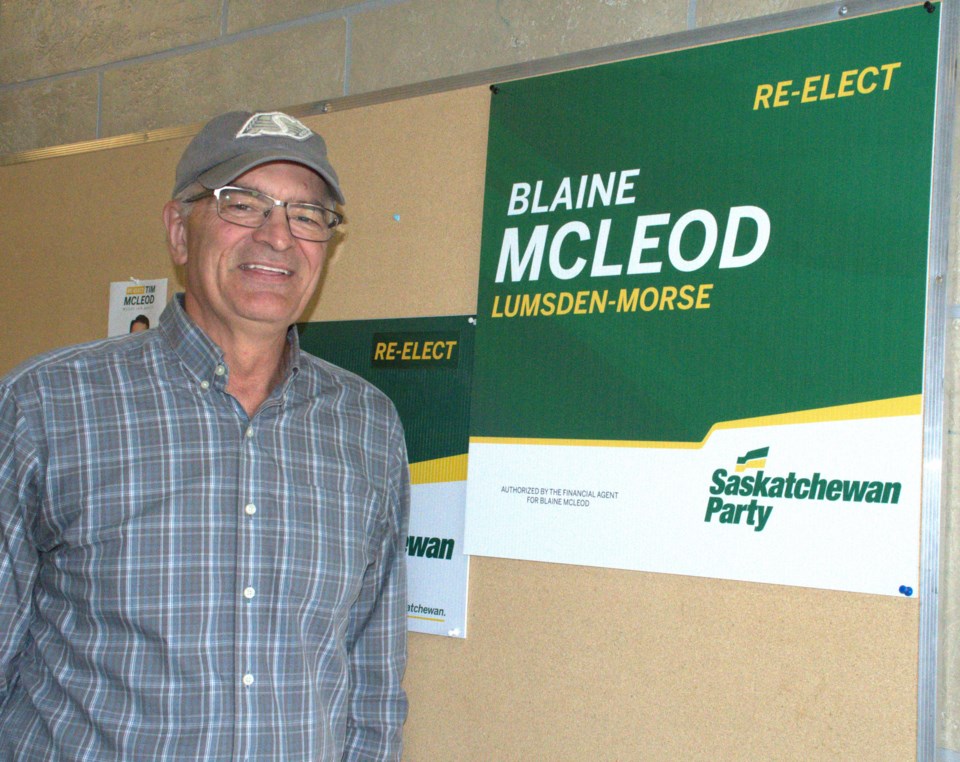LUMSDEN-MORSE - Sask. Party candidate Blaine McLeod hopes voters in the Lumsden-Morse constituency return him to the Legislature because of his decades of business experience and his past 14 months of relationship-building in the area.
McLeod is the incumbent after winning the byelection in August 2023. During this fall’s provincial election, he is going up against the NDP’s , the Sask. United Party’s Jon Hromek and the Green Party’s Isaiah Hunter.
The past 14 months have been a great experience, especially since the Sask. Party caucus was warm and welcoming, McLeod said. The caucus meetings occurred regularly during the fall and winter sessions, which allowed him to offer input into policy changes — including Bill 137’s The Parental Bill of Rights — and voice concerns from his constituents.
The Lumsden-Morse incumbent appreciated being in the room, having his voice heard, and building support for ideas he may have brought forward. This was crucial since he wanted to leave Saskatchewan a better place for all families.
Furthermore, he was honoured to be named the government’s liaison with the military community after Moose Jaw-Wakamow MLA Greg Lawrence was removed from the party because of alleged criminal offences.
“That has been a delight to connect with veterans and serving members, those (who) keep our country strong and free,” he remarked.
The rural Lumsden-Morse constituency is roughly 50,000 square kilometres in size and stretches from Saskatchewan Landing Provincial Park in the west to Regina in the east and Diefenbaker Lake in the north to Claybank in the south.
The main issues facing the riding are funding the agricultural-focused crop insurance program, building and maintaining infrastructure — like highways — and supporting economic activity, said McLeod.
He was thankful that this farming season wasn’t a disaster since it would have drained the crop insurance fund. While crops west of Moose Jaw were poor, crops toward Regina were better than average. These results allowed the province to replenish the insurance program and keep it functional.
While there isn’t enough money to repair infrastructure as quickly as residents want, the province is making progress and funding highways regularly, with the gas tax completely supporting those initiatives, McLeod said.
“So for people (such as the NDP) to suggest that we cancel the gas tax and give that back to the people, well, where are they going to get $620 million that goes into highways every year?” he continued. “… it just doesn’t appear out of thin air.”
Furthermore, the government can’t just cut the Provincial Sales Tax (PST) as the NDP wants because replacement money must come from somewhere, while the province can’t increase royalties on potash like the Sask. United Party wants because that would drive away investment, he added.
During the past 14 months, McLeod spoke with 16 of 17 rural municipal governments in his constituency about issues like highways since he believes they are the province’s foundation. He thought those meetings were valuable to hear directly from people responsible for community infrastructure and governance.
McLeod particularly liked connecting with Stewart Valley near Swift Current because he campaigned there during the 2023 byelection and learned that the school had burned down two years ago. He wants to help rebuild it but noted that the situation is “bogged down” with insurance issues.
“That’s one where I want to make a difference … so kids don’t have to be on the bus for that hour-plus time period,” he added.
McLeod says the attitude he brings is being “an always-on person,” where if someone stops him on the street or at a restaurant, he will either spend time listening to their concerns or record their contact information for a later meeting.
He says he developed this attitude after working on and running a dairy farm, where cows must be milked daily, there’s rarely a day off and something must be fixed if it breaks.
“I think I bring an approach that is very much common sense-oriented and … I have the practical experience of having farmed in this constituency my whole adult life,” McLeod remarked. “And (I) built a solid business based on the foundation of my dad before me in the dairy industry. And … I cut my teeth as such in politics in the dairy industry.”
One “cool part” of being an MLA that McLeod has enjoyed is being in regular awe of the Legislative building. He pointed out that only about 800 people have ever been an MLA since Saskatchewan became a province in 1905, so that is a select group. Moreover, he appreciates the vision that Walter Scott, the province’s first premier, had when he had the building constructed.
“That’s inspiring to me,” McLeod added.
The provincial election is Monday, Oct. 28.




